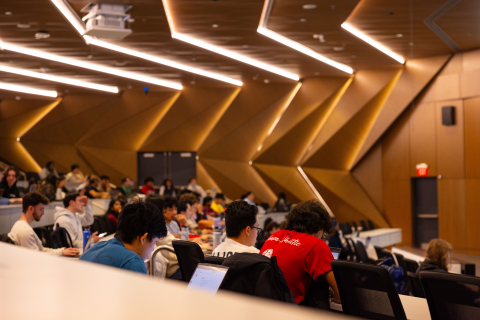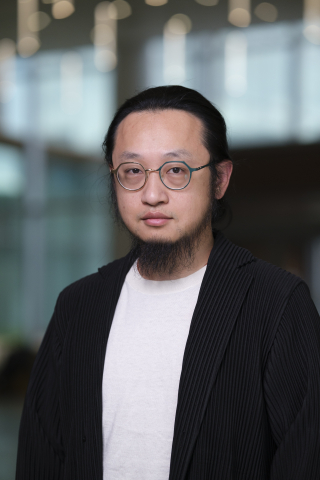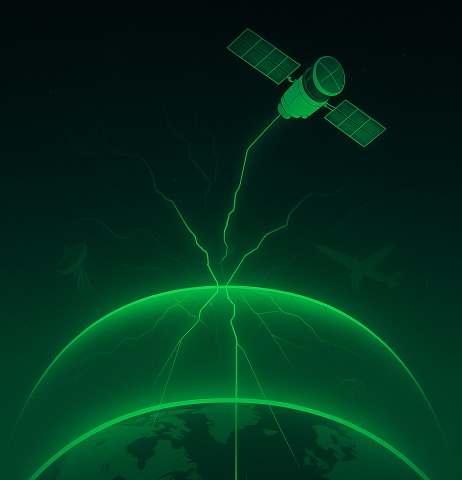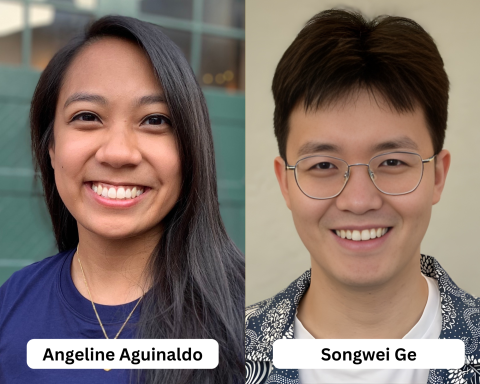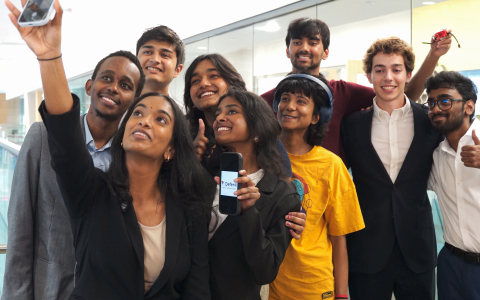News and Events
Recent News & Accomplishments
2025
These classes help undergraduates understand and apply artificial intelligence.
The University of Maryland offers an unparalleled educational experience in artificial intelligence (AI) through both innovative curriculum and cutting-edge research. This combination positions UMD students to be leaders in the AI landscape. From game design to transforming messy data to applying data science to real-world issues, UMD’s Department of Computer Science offers plenty of interdisciplinary AI classes taught by expert faculty members. Now that it’s time to register for courses for the Spring 2026 semester, check out some unique options from CMNS for undergraduate students to study... read more
He discusses his career path, research on human-computer interaction, and the importance of sustainable innovation.
University of Maryland Assistant Professor of Computer Science Huaishu Peng focuses his research on bridging the gap between digital and physical interactions. His work in human-computer interaction (HCI) explores how devices such as small robots, wearable technologies and haptic interfaces can make computing more tangible and accessible. In this Q&A, Peng discusses his path into computer science, his research directions and how his work contributes to sustainability and new ways of connecting humans and machines. Was there a defining moment that shaped your career path into computer... read more
Robel Endashaw and Abubakr Hussien create Cube, a digital platform inspired by traditional Ethiopian money pools that promotes shared saving and accountability.
When University of Maryland computer science students Robel Endashaw (B.S. ’25, computer science) and Abubakr Hussien (B.S. ’26, computer science) began discussing money management, their conversation turned toward a familiar concept rooted in their culture. Growing up in Ethiopian households, both had witnessed the traditional “Ekub,” a community savings circle where members pool money and take turns receiving a lump sum to help families cover emergencies, support education or start businesses. Now, as second-generation Ethiopians studying in the United States, they are giving that system a... read more
UMD researchers explore biologically inspired sensing to help robots navigate without predefined measurements.
Many robotic systems rely on sophisticated cameras and sensors to “see” their surroundings. Humans do this naturally; babies and toddlers learn to judge size and distance by comparing objects to their own bodies. But robots lack this ability, with most needing precise measurements and calibrations to understand their environment. Seeking a solution to this problem, University of Maryland researchers are developing robotic sensing abilities that mimic biological systems, which ultimately could allow robots to navigate and manipulate objects without pre-programmed measurements. Their work was... read more
He discusses his path into data visualization and human-centered AI.
University of Maryland Assistant Professor of Computer Science Leo Zhicheng Liu focuses his research on the intersection of artificial intelligence, human-computer interaction and data visualization. His work aims to make data analysis and communication more intuitive for domain experts who may not have a technical background in computing. Liu leads the Human Data Interaction Group , affiliated with the Human-Computer Interaction Lab (HCIL), a cross-disciplinary research center that brings together faculty from computer science, information studies, and education. In this interview, Liu... read more
Associate Professor Dave Levin spoke with WIRED about the findings.
Satellites beam data down to the Earth all around us, all the time. So you might expect that those space-based radio communications would be encrypted to prevent any snoop with a satellite dish from accessing the torrent of secret information constantly raining from the sky. You would, to a surprising and troubling degree, be wrong. Roughly half of geostationary satellite signals, many carrying sensitive consumer, corporate, and government communications, have been left entirely vulnerable to eavesdropping, a team of researchers at UC San Diego and the University of Maryland revealed today in... read more
Angeline May Aguinaldo and Songwei Ge received the awards for the 2025–26 academic year.
The University of Maryland’s Department of Computer Science has announced the recipients of the 2025–26 Larry S. Davis Doctoral Dissertation Award. Angeline Aguinaldo (Ph.D. ’25, computer science), now a senior research staff member at the Johns Hopkins University Applied Physics Laboratory, and Songwei Ge (Ph.D. ’25, computer science), a research scientist at Reve, were selected for the honor. The award recognizes dissertations for their technical depth, significance, potential impact and presentation quality. Named after Professor Emeritus Larry S. Davis , the award honors students who... read more
More than 9% of all news in U.S. newspapers contains at least some text created by artificial intelligence (AI), according to new research led by University of Maryland computer scientists. The study, based on analysis using a tool developed by Pangram Labs, also found that AI use in published articles is rarely disclosed, and that usage is much higher in smaller local outlets than nationally circulated papers. It was posted Thursday on the preprint server ArXiv. “As a reader, you generally don’t have a way to know if the news or the opinions are coming from a human or from AI,” said Mohit... read more
The team’s project, DefenX, uses artificial intelligence to detect and track firearms, send alerts and offer post-incident mental health support.
Concerns over school safety have grown in recent years as threats and incidents of gun violence continue to affect educational communities nationwide. While schools have adopted drills and surveillance systems to improve preparedness, many still seek more effective ways to prevent and respond to potential dangers. At the University of Maryland, a group of students is exploring how artificial intelligence can help close that gap. Their work culminated in a first-place finish at the 2025 Xperience Competition for their project, DefenX, an AI-based gun detection and alert system designed to... read more
Capy’s Journey transforms meditation into an interactive adventure to promote wellness and focus among young users.
As children spend more time on digital devices, questions continue to grow about how constant screen exposure affects their attention and emotional health. While many mindfulness apps target adults, few are designed for younger audiences. A team of University of Maryland students is trying to change that through Capy’s Journey , a mobile app that blends meditation with gameplay to help kids build lasting wellness routines. Developed by computer science major Olivia Zhang (B.S. ’27, computer science), neuroscience major Rohan Vyas (B.S. ’28, neuroscience) and Cornell University student Caleb... read more
Featured Videos
When Transfer Learning Meets Deep Learning
Professor Qiang Yang, Hong Kong UniversityNovember 27, 2017
Video
Cryptographic Perspectives on the Future of Privacy
Jonathan Katz, Department of Computer Science, University of MarylandSeptember 06, 2017
An Expanding and Expansive View of Computing
Jim Kurose, National Science FoundationJanuary 30, 2017
Video
Data, Predictions and Decisions in Support of People and Society
Eric Horvitz, Technical Fellow and Director at MicrosoftOctober 24, 2016
Video
The One Hundred Year Study on Artificial Intelligence: An Enduring Study on AI and its Influence on People and Society
Eric Horvitz, Technical Fellow and Director at MicrosoftOctober 24, 2016
